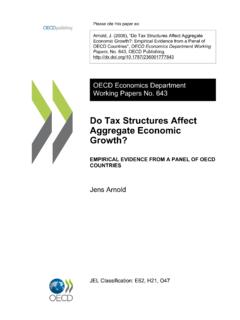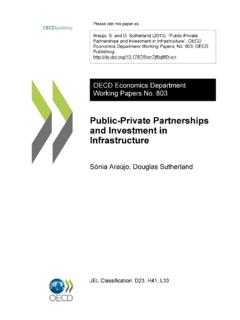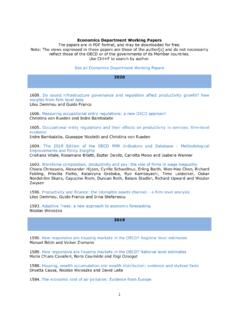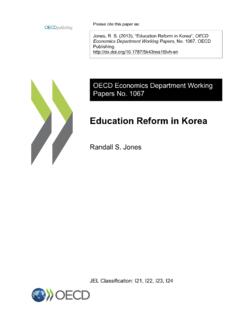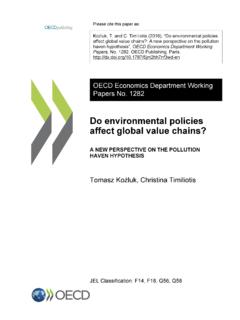Transcription of OECD Economics Department Working - memofin.fr
1 Please cite this paper as:Ko luk, T. and V. Zipperer (2013), Environmental Policiesand Productivity Growth: A Critical Review of EmpiricalFindings , OECD Economics Department Working Papers,No. 1096, OECD Economics Department WorkingPapers No. 1096 Environmental Policies andProductivity GrowthA CRITICAL REVIEW OF EMPIRICAL FINDINGST omasz Ko luk, Vera ZippererJEL Classification: D24, O31, O47, Q50, Q55, Q58 Unclassified ECO/WKP(2013)
2 88 Organisation de Coop ration et de D veloppement conomiques Organisation for economic Co-operation and Development 19-Nov-2013 _____English text only Economics Department ENVIRONMENTAL POLICIES AND PRODUCTIVITY GROWTH - A CRITICAL REVIEW OF EMPIRICAL FINDINGS Economics Department Working PAPERS No. 1096 By Tomasz Ko luk and Vera Zipperer All Economics Department Working Papers are available through OECD's Internet website at JT03348802 Complete document available on OLIS in its original format This document and any map included herein are without prejudice to the status of or sovereignty over any territory, to the delimitation of international frontiers and boundaries and to the name of any territory, city or area.
3 ECO/WKP(2013)88 Unclassified English text only ECO/WKP(2013)88 2 ABSTRACT/R SUM Environmental policies and productivity growth - a critical review of empirical findings The economic effects of environmental policies are of central interest to policymakers. The traditional approach sees environmental policies as a burden on economic activity, at least in the short to medium term, as they raise costs without increasing output and restrict the set of production technologies and outputs.
4 In contrast, the Porter Hypothesis claims that well-designed environmental policies can provide a free lunch encouraging innovation, bringing about gains in profitability and productivity that can outweigh the costs of the policy. This paper reviews the empirical evidence on the link between environmental policy stringency and productivity growth, and the various channels through which such effects can take place. The results are ambiguous, in particular as many of the studies are fragile and context-specific, impeding the generalisation of conclusions.
5 Practical problems related to data, measurement and estimation strategies are discussed, leading to suggestions how they can be addressed in future research. These include: improving the measurement of environmental policy stringency; investigating into effects of different types of instruments and details of instrument design; exploiting cross-country variation; and the complementary use of different levels of aggregation. JEL classification codes: D24; Q50; Q55; Q58; O47; O31.
6 Keywords: Environmental policy, Porter Hypothesis, Productivity, Innovation. ** Politiques environnementales et croissance de la productivit - un examen critique des r sultats empiriques Les effets conomiques des politiques environnementales rev tent un int r t crucial pour les responsables de l'action publique. Suivant l'approche classique, les politiques environnementales sont consid r es comme un fardeau pour l'activit conomique, au moins dans une perspective de court moyen terme, tant donn qu'elles entra nent une hausse des co ts sans pour autant faire augmenter la production et qu'elles limitent l' ventail des technologies de production et des produits.
7 L'inverse, suivant l'hypoth se de Porter, des politiques environnementales judicieusement con ues peuvent procurer des avantages sans contrepartie, en encourageant l'innovation et en d bouchant sur des gains de rentabilit et de productivit qui peuvent l'emporter sur les co ts des politiques consid r es. Nous examinons dans ce document de travail les donn es empiriques relatives la relation existant entre la rigueur des politiques environnementales et la croissance de la productivit , ainsi que les diff rents canaux via lesquels les effets consid r s peuvent se produire.
8 Les r sultats de cet examen sont ambigus, notamment dans la mesure o de nombreuses tudes sont fragiles et sp cifiquement li es un contexte donn , ce qui ne permet pas d'en g n raliser les conclusions. Des probl mes pratiques li s aux donn es ainsi qu'aux strat gies de mesure et d'estimation sont examin s, et des propositions sont formul es en vue d'y rem dier dans le cadre de futurs travaux de recherche. Il est notamment sugg r d'am liorer la mesure de la rigueur des politiques environnementales, d'analyser les effets des diff rents types d'instruments et d'examiner en d tail leur conception, d'exploiter les variations observ es entre pays, et d'utiliser de mani re compl mentaire diff rents niveaux d'agr gation.
9 Classification JEL : D24; Q50; Q55; Q58; O47; O31 Mots-cl s : politique environnementale, hypoth se de Porter, productivit , innovation OECD (2013) You can copy, download or print OECD content for your own use, and you can include excerpts from OECD publications, databases and multimedia products in your own documents, presentations, blogs, websites and teaching materials, provided that suitable acknowledgment of OECD as source and copyright owner is given. All requests for commercial use and translation rights should be submitted to ECO/WKP(2013)88 3 TABLE OF CONTENTS ENVIRONMENTAL POLICIES AND PRODUCTIVITY GROWTH - A CRITICAL REVIEW OF EMPIRICAL FINDINGS.
10 5 Introduction .. 5 Background on the channels through which environmental policies may affect economic outcomes .. 6 The conventional argument diverting resources from productive allocations .. 6 The Porter Hypothesis a free lunch? .. 9 Trade, foreign direct investment and competitiveness .. 11 Empirical evidence .. 11 11 Innovation as a driver of productivity growth .. 14 Evaluating effects of different policy instruments .. 15 Effects on capital stock and investment .. 15 Challenges for empirical implementation.

